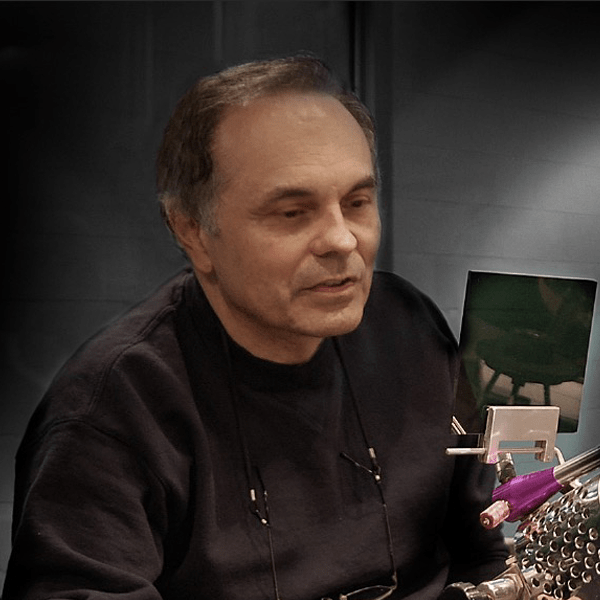
Victor Trabucco talks about the staged nature of the photo of Charles Kaziun standing in front of a furnace [above], and of Kaziun separating himself from the glass community.
01:45Victor Trabucco talks about the staged nature of the photo of Charles Kaziun standing in front of a furnace, and of Kaziun separating himself from the glass community. Oral history interview with Victor Trabucco by Barb Elam, conducted via telephone, September 16, 2019, Bard Graduate Center. Clip length: 01:45.
Time stamp: 00:00
Clip 1: Victor Trabucco talks about the staged nature of the photo of Charles Kaziun in front of a furnace, from Jean Melvin’s book American Glass Paperweights and Their Makers. Clip length: 00:44.
Victor Trabucco: Well he [Charles Kaziun] was really the first lampworker to really make fine paperweights with a torch. He really did. I know the picture—they show him, he’s standing there with a punty rod and standing in front of a furnace and everything in the Jean Melvin book. [laughs] That was staged. He never made his weights that way. I think even at that point he was trying to mislead. [laughs] He didn’t want artists or anybody to know what he did. He was extremely secretive. He was so secretive that he really lost touch where common things were made, like he didn’t know where to get—like I said, Kugler glass and all the German Zimmerman glass, and all that, which was very well known, and so I just told him all about that.
Time stamp: 00:45
Clip 2: Victor Trabucco discusses Charles Kaziun being removed from the glass community. Clip length: 00:59.
Victor Trabucco: He just removed himself so much from the glass community that some of the common knowledge, after a while—the German colors were so well-known. I mean, there’s dealers all across the country that sold Kugler glass, imported it and that was one of the common glasses we used: Kugler, Zimmerman, and then the Italian glass. And all those things were very available at this point, but he got his glass from a company called Conlon [Conlon Glass, Hicksville, New York]. And, in fact, they’re out of business. They were somewhere here in New York. But they used to make his clear rod. And he would always—he would have to sort through it to find stuff that was good enough for him to use, and I even had—I got some glass from a glassblower that had died and I bought all his glass and everything that he had left, and some of them had strings around it and they had Kaziun’s name on it. So they were setting it aside for Charlie. [laughs]